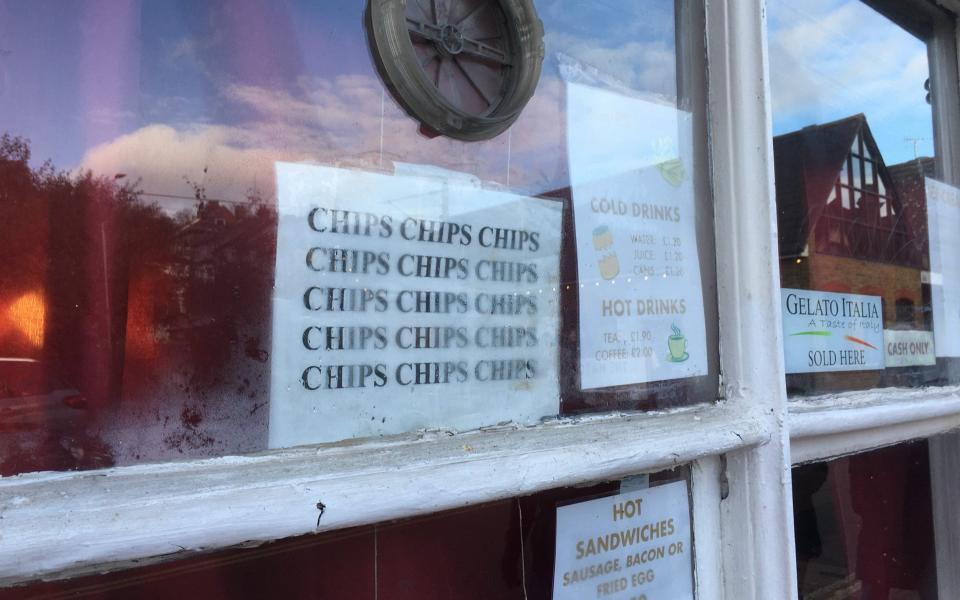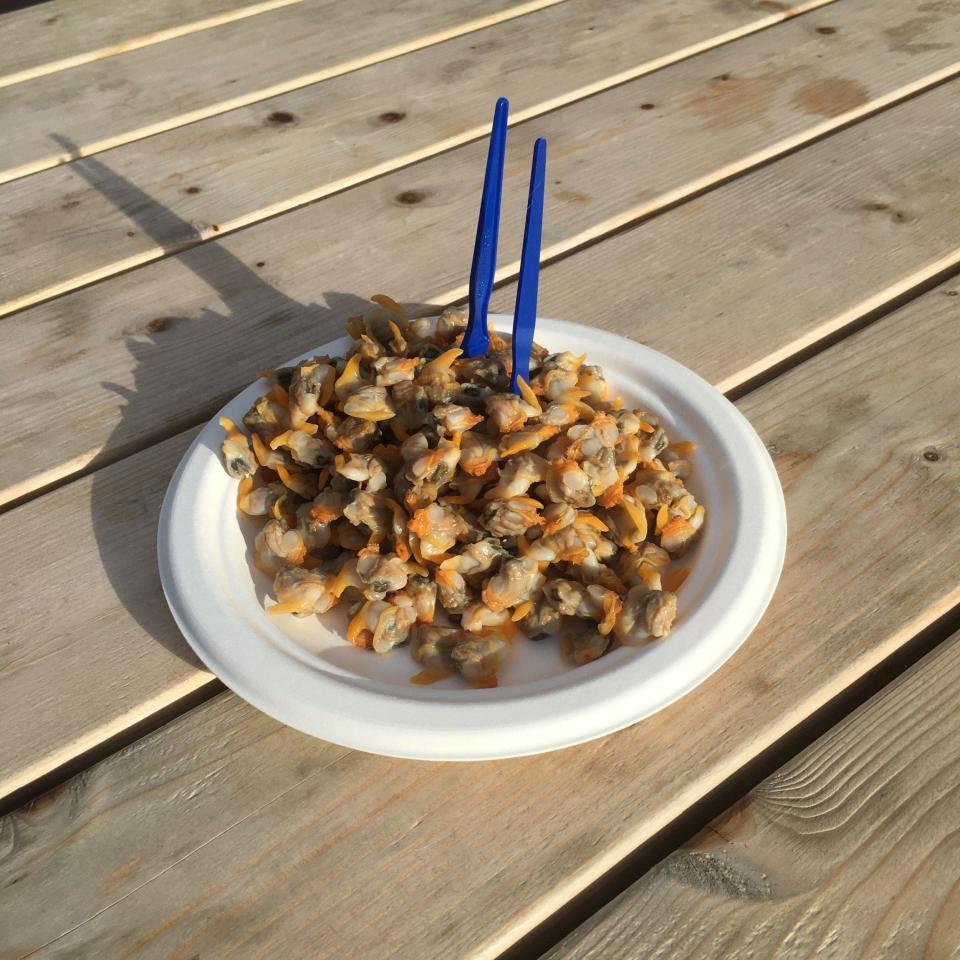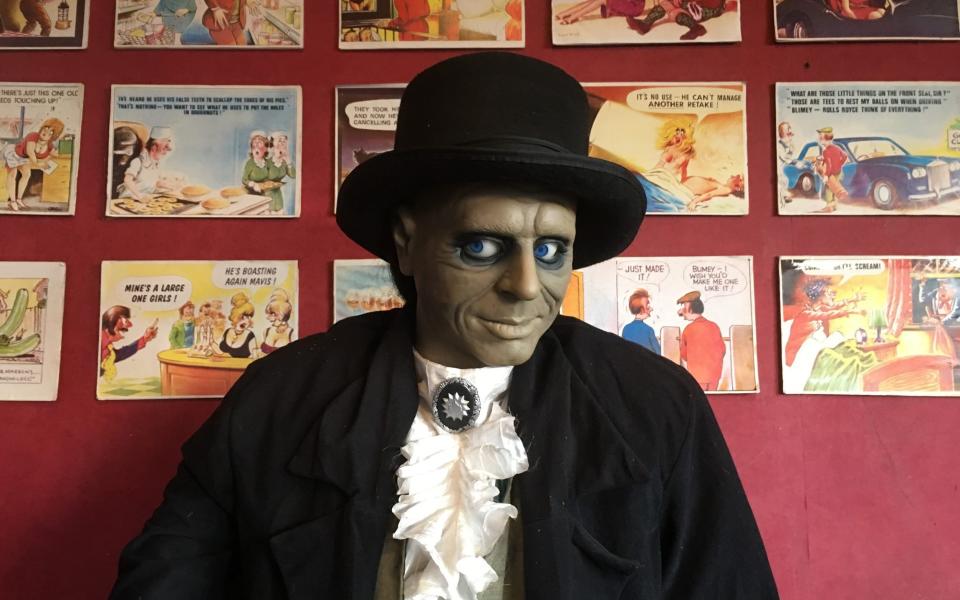The eccentric new city that's as authentically English as you can find

The sea shimmered in the late November sun, while cold water swimmers rippled its silvery surface. On the water’s edge, families huddled around polystyrene pots, jabbing cockles with plastic forks. Above the old customs house a Union Jack hung limply.
I was in Leigh-on-Sea, officially a district of Southend, to take the pulse of Britain’s newest city — an honour granted in tribute to murdered MP Sir David Amess. I was fresh off the train and gasping for a cuppa, so I dived into Strand Tea Rooms. Its bygone English aesthetic — the red and white glossy paintwork — appealed, and the condensation dripping down the windows suggested warmth inside. There was also a sign that hinted at eccentricity. “CHIPS CHIPS CHIPS CHIPS CHIPS CHIPS CHIPS CHIPS CHIPS...”
I walked in. No punters. Bacon in the air. The owner, Michael, took my order as I admired the décor: red curtains, Tiffany lights, old photos on the wall, a jolly roger flag. Outside, ageing Mods spluttered past on Lambrettas. No Rockers to fight anymore, but for a moment the last half century hadn’t happened. The Jam played on the stereo.

My tea arrived: builder’s brew, in a mug. I thought aloud about going for a swim myself. “I wouldn’t,” said Michael. “There’s a lot of… well, I don’t wanna put you off your tea, but think about where we are.”
Where we were was the north coast of the Thames Estuary, where London’s dirty old river spills out. There’d been protests about sewage recently. The stuff had been blithely discharged into local bathing spots, as elsewhere in England. I told Michael that people were still swimming in it. “Have you seen ‘em? They don’t look well.”
Leigh is 50 minutes by train from London, but feels further. Its cobbled high street is lined with pubs and stalls selling shellfish; cockles mainly, the local speciality. Fishing boats bob in the marina, and across the estuary you can see Grain Power Station in Kent.

The Strand is where they used to lock up smugglers. But for as long as anyone can remember it was a tearoom run by Michael’s late grandmother, who bequeathed it to him.
Leigh is a working town; gritty, like the cockles. Or was. Times are changing. “It’s all paninis, soy lattes and man buns now; plain looking girls walking around in culottes,” quipped Michael. “When this place goes it’ll be like the ravens leaving the Tower of London. There’ll be nothing left except plastic and wokeism.”
Leigh’s mix of affluent, “soy milk-drinking” incomers and what Michael described as “extreme Essex” – that is flash, brash gals and geezers with the local patter – makes for an intriguing mix. They rub along fine, he said, save for a few post-Brexit arguments about the Union Jack over the customs house. Worse things happen on Friday and Saturday nights during summer, he admitted, describing them as “like the last days of Pompeii”.
I reluctantly left Michael and his sardonic wit to walk along the coast to Southend proper. On the way, I passed benches with bunches of flowers taped to them – a tribute to Sir David. He was well liked. “Man of the people” is a phrase that comes up a lot. “Gentleman,” is another. He campaigned for Southend to be granted city status. As a tribute, it was.

Walking to the city centre, I could see why affluent Londoners were moving in: pretty Victorian houses lined the seafront, offering idyllic coastal living. They were built when Southend the fishing village became Southend the seaside resort. The town declined in that familiar way, as foreign holidays became cheaper. Adding insult to injury, the local airport helped people escape. That they rebranded it London Southend Airport exposed another problem – the town was considered an extension of the capital. Professionals priced out of London moved in and commuted out. It became a dormitory town.
Yet Southend’s proximity to London was also a blessing. While the rot became terminal in other seaside towns, Southend at least had a stream of day-trippers from the capital. They came for fairground thrills at Adventureland – a sprawling monument to commercialised fun in front of the world’s longest pier – and boozy coach trips known as cockney beanos.
I reached the bright lights – and bright they were. The neon glow from the amusement arcades bounced off the seagull poo-splattered pavement. Inside slot machines made promises of riches, and broke them. A few pubs punctuated these racketeers. Pubs with cheap booze and tribute bands. Pubs that brought stag dos to mind. Pubs where Halloween decorations are perennial.
“He’ll stay here now,” said the barman at The Cornucopia, pointing to a macabre, jabot-wearing mannequin installed for Halloween but now part of the furniture.

Three things pulled me into The Cornucopia. One, the roguish black and gold paint job. Two, the sign “reputedly Essex’s smallest pub.” Three, the sign “most improved pub of the year 2007”. I stepped inside and wondered what it was like before. At the bar was a drunk guy and his wife watching the F1 on a phone, and another couple, who the drunk guy kept apologising to for being drunk. Still, £3.50 for a pint of John Smiths.
I liked The Cornucopia, I really did. There was an honesty to it, an authenticity. And the saucy postcards on the wall reminded me of childhood holidays by the sea. I thought of Michael. “Paninis, soy lattes, man buns.” There was none of that here.
Did the mannequin have a name? The barman thought it was Hogarth. Which was funny because I was expecting Hogarthian scenes down Southend high street (I’d been reading up online ahead of my visit). But I was disappointed. It looked like any other high street: parasitic chains, empty shops, a few independents, hooded youths on e-scooters, a general sense of decline. It made me wonder what the future holds for Britain’s high streets. Surely the revival can’t be fuelled by vape shops.
The beach was calling. A one-star TripAdvisor review drew me there. “What a joke,” lamented keyboard warrior frad70. “Dirty, muddy water is not the worst thing. Not even the smell of smoked marijuana.” What was it, then? “Razor-like, fossilised shells make it impossible to walk in the water without shoes on – even if you do wear them try not to fall down or you may see blood on your hands. Your blood pouring from some fresh wound.” I simply had to go.

Again, disappointing. The water was clear, the shells blunt and I couldn’t find any marijuana. So I walked back along the prom and got an ice cream from Rossi’s. Great little parlour, Rossi’s. Founded by Italians who understand the English, and have the all-day breakfast to prove it. The place buzzed; families sharing ice cream, OAPs eating sausages, lads hanging around a red Lambo outside.
I walked with my ice cream up through manicured gardens to Westcliff. Southend had given me a spring in my step; something about the light, the air perhaps. The houses at the top were so pretty I started scrolling Rightmove after I’d checked into the Ilfracombe House Hotel, which, pleasingly, had a signed picture of Dot Cotton behind reception.
Back in town, I called at the Gaiety Bazaar, an emporium selling rock, souvenirs, air guns and knives; a disconcerting amount of knives. And golliwogs, too. You’ve got to have some front selling those these days – it could be enough to put you off entirely. I bought fudge, which came with a postcard of Southend on the packet. Again, childhood holiday memories flooded back.

I soon realised how small Southend is, which raised a question: what makes a city a city? The wonderfully archaic cathedral barometer is clearly unfit. What about a place’s cultural clout? Because, no disrespect to Brian Conley, or Jack Dee, or The Darkness, but Southend didn’t appear to have a rich programme. For lack of other Sunday night entertainment, I went to see The Darkness — good fun it was, too. Bombastic? Of course. Relevant? Not really. But up for it, honest, not taking things too seriously. A lot like Southend.
During their set I realised that I didn’t care about the whole city thing. It mattered not – don’t go to Southend because it’s a city; go because it’s pretty, gritty, sentimental, eccentric, proud of its past, uncertain of its future, and about as authentically English as you can get in 2021.
For more recommendations, see Telegraph Travel's complete guide to the best hotels in Essex.

